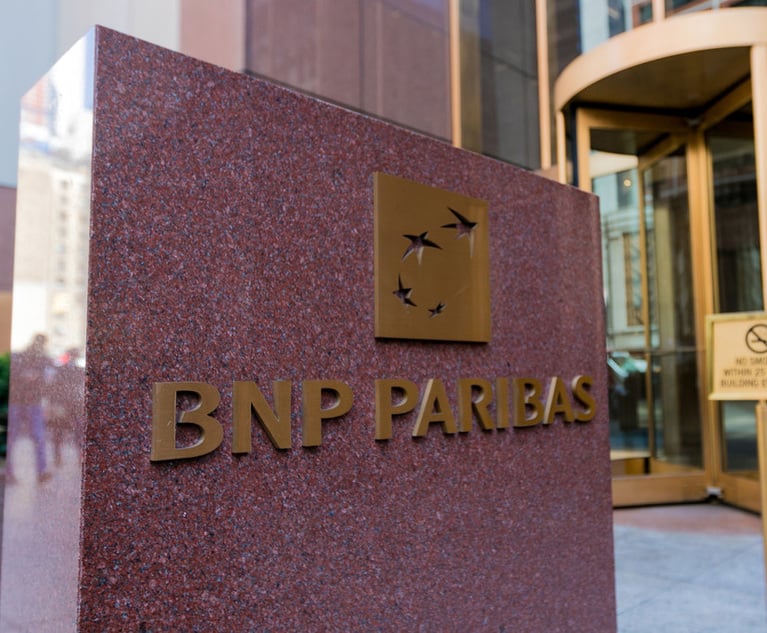2nd Circuit Says Dodd-Frank Law Does Not Preclude Arbitration of Whistleblower Claims
The decision brought the Second Circuit in line with the Third Circuit, the only other federal appeals court to have ruled on the issue.
September 19, 2019 at 06:37 PM
3 minute read

The U.S. Court of Appeals for the Second Circuit held for the first time Thursday that whistleblower claims brought under the Dodd‐Frank Wall Street Reform and Consumer Protection Act of 2010 can be forced into arbitration.
The decision, in a case where a former Citigroup executive alleged gender discrimination and retaliation, brought the Second Circuit in line with the Third Circuit, the only other federal appeals court to have ruled on the issue.
In a 33-page opinion, a three-judge panel of the Second Circuit said the landmark financial regulation law had amended other acts to include provisions barring arbitration for whistleblower claims, but was tellingly silent with respect to its own whistleblower provision.
"Congressʹs failure to attach an anti‐arbitration provision to the Dodd‐Frank whistleblower provision … while simultaneously amending similar statutory regimes to include the same, is a strong indication of its intent not to preclude Dodd‐Frank whistleblower claims from arbitration," Second Circuit Judge Robert D. Sack wrote.
The decision upheld a Manhattan federal judge's 2017 ruling, which dismissed a lawsuit by Erin Daly, a former vice president of Citi's private bank division, who claimed she was marginalized based on her gender and later fired after reporting her boss for requesting that she disclose nonpublic information so that he could pass it along to his clients.
U.S. District Judge Richard J. Sullivan had held that Daly's claims were subject to a contractual provision requiring that "all employment‐related disputes" be sent to arbitration. He also dismissed a claim under the Sarbanes-Oxley Act because Daly had failed to first file an administrative complaint through the proper channels.
On appeal, Daly argued that Sarbanes-Oxley's anti-arbitration provision extended to her claims under Dodd-Frank because both involved the same whistleblower activity.
But Sack found that, in addition to Dodd-Frank's silence on arbitration, there were key differences between the whistleblower statutes that prevented Sarbanes-Oxley's whistleblower protections from extending to Dodd-Frank.
For instance, he said whistleblowers under Sarbanes-Oxley must first lodge an administrative complaint through the Department of Labor's Occupational Safety and Health Administration, and whistleblowers proceeding under Sarbanes-Oxley are able to obtain back pay, with interest, while Dodd-Frank whistleblowers are entitled to double that amount.
"These differences in the statutesʹ whistleblower provisions support our conclusion that Congress did not intend for SOXʹs anti‐arbitration provision to extend to whistleblower claims arising under Dodd‐Frank," he said.
Sack was joined in the opinion by Judges Peter W. Hall and Christopher F. Droney.
An attorney for Daly did not immediately return a call seeking comment late Thursday afternoon.
An attorney for Citi did not immediately provide comment.
Daly was represented by Michelle N. Daly, an attorney in Hopewell Junction, New York.
Citi was represented by Lisa B. Lupton and Michael Delikat of Orrick, Herrington & Sutcliffe in New York.
The case was captioned Daly v. Citigroup.
Read More:
2nd Circuit Revives Suit by Brooklyn-Born Man Wrongly Held on Immigration Detainer
Second Circuit Throws Out Malicious Prosecution Suit Against NYPD Detective
Panel Reinstates Gender Discrimination Claim, Pointing to Contradiction in Lower Court Ruling
This content has been archived. It is available through our partners, LexisNexis® and Bloomberg Law.
To view this content, please continue to their sites.
Not a Lexis Subscriber?
Subscribe Now
Not a Bloomberg Law Subscriber?
Subscribe Now
NOT FOR REPRINT
© 2025 ALM Global, LLC, All Rights Reserved. Request academic re-use from www.copyright.com. All other uses, submit a request to [email protected]. For more information visit Asset & Logo Licensing.
You Might Like
View All
The CFPB Is Digging In for Last Days of Biden's Term. But What Happens Next?
6 minute read

NY AG James Targets Crypto Fraud Which Allegedly Ensnared Victims With Fake Jobs
4 minute read
'Merciless' Filing Deadline Dooms Cuban Americans' Property-Trafficking Suit Against BNP Paribas, SocGen
4 minute readTrending Stories
- 15th Circuit Considers Challenge to Louisiana's Ten Commandments Law
- 2Crocs Accused of Padding Revenue With Channel-Stuffing HEYDUDE Shoes
- 3E-discovery Practitioners Are Racing to Adapt to Social Media’s Evolving Landscape
- 4The Law Firm Disrupted: For Office Policies, Big Law Has Its Ear to the Market, Not to Trump
- 5FTC Finalizes Child Online Privacy Rule Updates, But Ferguson Eyes Further Changes
Who Got The Work
J. Brugh Lower of Gibbons has entered an appearance for industrial equipment supplier Devco Corporation in a pending trademark infringement lawsuit. The suit, accusing the defendant of selling knock-off Graco products, was filed Dec. 18 in New Jersey District Court by Rivkin Radler on behalf of Graco Inc. and Graco Minnesota. The case, assigned to U.S. District Judge Zahid N. Quraishi, is 3:24-cv-11294, Graco Inc. et al v. Devco Corporation.
Who Got The Work
Rebecca Maller-Stein and Kent A. Yalowitz of Arnold & Porter Kaye Scholer have entered their appearances for Hanaco Venture Capital and its executives, Lior Prosor and David Frankel, in a pending securities lawsuit. The action, filed on Dec. 24 in New York Southern District Court by Zell, Aron & Co. on behalf of Goldeneye Advisors, accuses the defendants of negligently and fraudulently managing the plaintiff's $1 million investment. The case, assigned to U.S. District Judge Vernon S. Broderick, is 1:24-cv-09918, Goldeneye Advisors, LLC v. Hanaco Venture Capital, Ltd. et al.
Who Got The Work
Attorneys from A&O Shearman has stepped in as defense counsel for Toronto-Dominion Bank and other defendants in a pending securities class action. The suit, filed Dec. 11 in New York Southern District Court by Bleichmar Fonti & Auld, accuses the defendants of concealing the bank's 'pervasive' deficiencies in regards to its compliance with the Bank Secrecy Act and the quality of its anti-money laundering controls. The case, assigned to U.S. District Judge Arun Subramanian, is 1:24-cv-09445, Gonzalez v. The Toronto-Dominion Bank et al.
Who Got The Work
Crown Castle International, a Pennsylvania company providing shared communications infrastructure, has turned to Luke D. Wolf of Gordon Rees Scully Mansukhani to fend off a pending breach-of-contract lawsuit. The court action, filed Nov. 25 in Michigan Eastern District Court by Hooper Hathaway PC on behalf of The Town Residences LLC, accuses Crown Castle of failing to transfer approximately $30,000 in utility payments from T-Mobile in breach of a roof-top lease and assignment agreement. The case, assigned to U.S. District Judge Susan K. Declercq, is 2:24-cv-13131, The Town Residences LLC v. T-Mobile US, Inc. et al.
Who Got The Work
Wilfred P. Coronato and Daniel M. Schwartz of McCarter & English have stepped in as defense counsel to Electrolux Home Products Inc. in a pending product liability lawsuit. The court action, filed Nov. 26 in New York Eastern District Court by Poulos Lopiccolo PC and Nagel Rice LLP on behalf of David Stern, alleges that the defendant's refrigerators’ drawers and shelving repeatedly break and fall apart within months after purchase. The case, assigned to U.S. District Judge Joan M. Azrack, is 2:24-cv-08204, Stern v. Electrolux Home Products, Inc.
Featured Firms
Law Offices of Gary Martin Hays & Associates, P.C.
(470) 294-1674
Law Offices of Mark E. Salomone
(857) 444-6468
Smith & Hassler
(713) 739-1250






